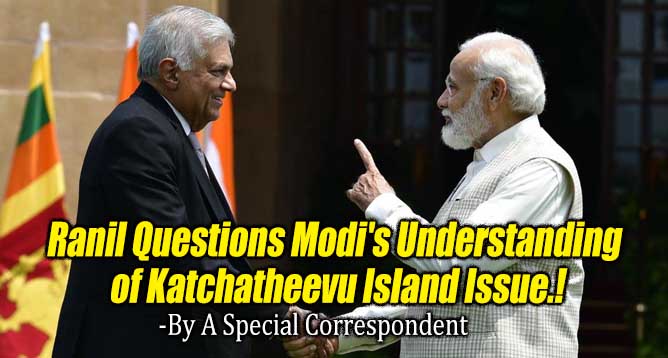By A Special Correspondent

(Lanka-e-News -15.April.2024, 2.50 PM) In a startling diplomatic development, Sri Lankan President Ranil Wickramasinghe has openly criticized the educational background and political acumen of Indian Prime Minister Narendra Modi and Foreign Minister Jayashankar, questioning their ability to comprehend the historical and bilateral agreements concerning the contentious Katchatheevu island.
During a candid conversation with a diplomat in Colombo, President Wickramasinghe expressed skepticism about Prime Minister Modi's educational qualifications, suggesting they might hinder his understanding of the 1974 bilateral agreement that saw the transfer of Katchatheevu island from India to Sri Lanka.
"Prime Minister Modi's lack of education may limit his capacity to grasp the significance and complexities of the 1974 bilateral agreement regarding Katchatheevu island," Wickramasinghe reportedly remarked, highlighting the importance of a nuanced understanding of historical treaties in resolving contemporary disputes.
Furthermore, President Wickramasinghe questioned the inexperience of Indian Foreign Minister Jayashankar, particularly in leveraging historical agreements for domestic political gains. He likened the situation to an ill-informed marriage to an ex Japanese Brothel worker by an Indian diplomat, that one regrets after decades, emphasizing the futility of using decades-old agreements for present-day electoral purposes.
Drawing attention to past grievances, President Wickramasinghe reminded of Sri Lanka's forced acceptance of the 1987 Indo-Lanka agreement, which led to the implementation of the 13th amendment to Sri Lanka's constitution. Despite this concession, he hinted at the possibility of annulling the agreement, signaling Sri Lanka's resolve to assert its sovereignty and national interests.
In a move indicative of escalating tensions, President Wickramasinghe contemplated summoning the Indian High Commissioner to Sri Lanka's Foreign Ministry and considering the expulsion of the Indian defense attaché in Colombo. These measures were reportedly in response to alleged interference by certain anti-Wickramasinghe factions in the 2024 Presidential elections.
The remarks by President Wickramasinghe underscore the deep-seated mistrust and unresolved issues between India and Sri Lanka, particularly concerning territorial disputes and historical agreements. They highlight the need for both countries to engage in constructive dialogue and respect each other's sovereignty to foster lasting peace and stability in the region.
As diplomatic tensions simmer, the onus lies on both nations to set aside differences and work towards mutually beneficial solutions, rather than allowing historical grievances to impede progress and cooperation. Only through genuine dialogue and respect for international agreements can India and Sri Lanka forge a path towards a brighter and more harmonious future.
President Wickramasinghe's threat comes amid renewed discussions and diplomatic exchanges between the two countries regarding the Katchatheevu issue. Speaking with well known in diplomatic circle in Colombo, he emphasized Sri Lanka's sovereignty over the island and its surrounding waters, warning that any attempts by India to assert its claims could have consequences.
"If India persists in its efforts to raise the Katchatheevu island issue, Sri Lanka will have no choice but to consider halting the transit of Indian cargo through the Colombo port," President Wickramasinghe declared, underlining the gravity of the situation.
The Colombo port, one of South Asia's busiest maritime hubs, serves as a crucial transit point for Indian cargo destined for various international markets. Any disruption to this transit route could have significant economic implications for India, as well as disrupt regional trade dynamics.
President Wickramasinghe's statement reflects growing frustration and impatience on the part of Sri Lanka over what it perceives as unwarranted interference in its internal affairs by India. Despite assurances of cooperation and dialogue, the Katchatheevu issue remains a sticking point in bilateral relations, fueling mistrust and resentment on both sides.
India, for its part, has reiterated its commitment to resolving the Katchatheevu issue through international Arbitration and renegotiation, However, President Wickramasinghe's warning serves as a stark reminder of the potential consequences of escalating tensions in the region.
Sri Lankan President Ranil Wickramasinghe has issued a stern warning to India, cautioning against any potential military actions aimed at reclaiming the disputed Katchatheevu island. In a bold statement, President Wickramasinghe asserted that Sri Lanka would fiercely defend its sovereignty, even if it meant engaging in conflict until the last citizen stood.
Amid escalating tensions over the Katchatheevu island, President Wickramasinghe made it unequivocally clear that Sri Lanka would not hesitate to safeguard its territorial integrity by any means necessary. His remarks came amidst speculations and concerns over possible military maneuvers by India to reclaim the island, which was ceded to Sri Lanka under the 1974 Indo-Sri Lankan agreement.
"Let there be no doubt – Sri Lanka will fight to preserve its sovereignty and territorial boundaries. We will not stand idly by if any attempt is made to challenge our sovereignty over Katchatheevu," President Wickramasinghe asserted during a discussion with well known diplomat in Colombo.
Moreover, President Wickramasinghe hinted at the possibility of seeking support from other allies, particularly China, to address Sri Lanka's security concerns. He emphasized that Sri Lanka would explore all available options to protect its interests and ensure regional stability.
"China has been a longstanding partner of Sri Lanka, and we will look to them to address our security concerns if necessary. We are prepared to defend our sovereignty with the support of our allies," President Wickramasinghe stated, signaling Sri Lanka's readiness to seek external assistance if the need arises.
The president's remarks underscore the gravity of the situation surrounding the Katchatheevu dispute and highlight Sri Lanka's determination to resist any external encroachment on its territory. The prospect of military confrontation between India and Sri Lanka raises serious concerns about the escalation of tensions in the region, with potential implications for regional security and stability.
As diplomatic efforts to resolve the Katchatheevu issue continue, it is imperative for both India and Sri Lanka to exercise restraint and seek peaceful avenues for dialogue and resolution. The specter of military conflict looms large, but concerted efforts towards diplomacy and negotiation offer the best hope for a peaceful and mutually acceptable solution to the longstanding dispute.
---------------------------
by (2024-04-15 09:28:44)
Leave a Reply